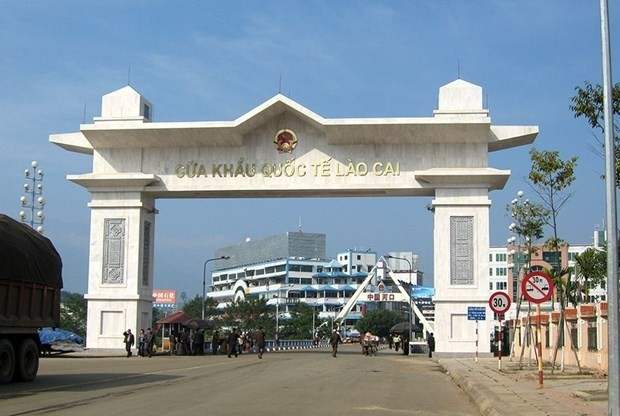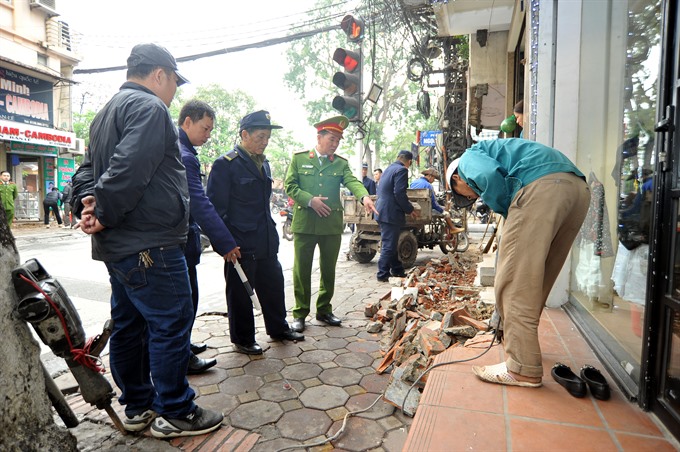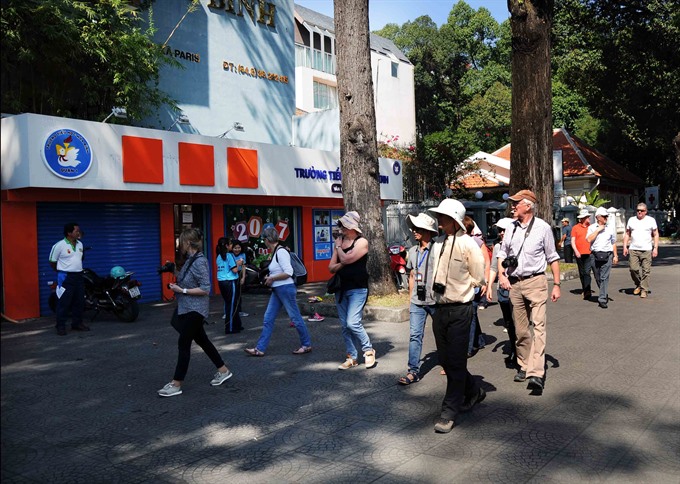

 |
| Hà Nội law enforcement remove stores’ front porches that encroached illegally onto pavements. — VNA/VNS Photo Thành Đạt |
HCM CITY — Authorities in HCM City who wielded a heavy stick against street vendors and pavement encroachments recently are now offering the carrot of empathy.
“It’s essential to recognise that those vendors on the pavements are also people of this city, they contribute to the city’s economy and tourism, they contribute to the city’s budget.
“The [pavement clearance] campaign must go on resolutely, but a reconciliation between reason and sensibility must be reached,” Đinh La Thăng, HCM City Party Secretary, said at city meeting on urban order held last weekend.
The hard-line stance adopted against pavement offenders, particularly in District 1, has been mostly welcomed by the public, but those who have been directly affected are decidedly upset, particularly those whose entire livelihoods are being taken away.
Their suffering has struck a chord and many people have called for a more accommodating campaign that takes people’s livelihoods into account.
While agreeing with the city Party Secretary about being more understanding, the city’s Justice Department head, Huỳnh Văn Hạnh, suggested “a window of 10 days” following the announcement that offenders must remove their properties from the pavement before more forceful measures are deployed.
“The issue has existed for many years now, waiting another ten days is hardly a problem,” Hạnh said.
“If we want to keep the pavements clean in the long term and in a sustainable manner, then everything must be done in line with protocol, avoiding rashness.
“One enforcement day must be followed by 10 days of raising awareness and persuading,” Hạnh said, adding that forced removal should be the last resort, and people should stop their violations voluntarily.
After all, he said, the current situation can be blamed as much on the negligence and even covert abetment of local authorities over the years.
Frank comment
Referring to a surprisingly frank comment from Hà Nội Chairman Nguyễn Đức Chung, who said 80 per cent of the sidewalk beer bars are ‘backed by the police’, Nguyễn Ngọc Tường, deputy head of the city’s traffic safety board, rhetorically wondered if a similar thing was happening in the southern metropolis.
Violations of public space are “vexingly ubiquitous”, yet “not a single local leader been subject to disciplinary action,” Tường said.
“Only very recently did District 1 and Củ Chi District decide to transfer, or hold some officials accountable for their management failures.”
When authority-level corruption ends and leaders govern by example, and law enforcement is unwavering, then it will be easy to persuade the public, Tường said.
Party Secretary Thăng said the management of every street will be assigned to an official who will be held responsible for any public disorder that occurs on it.
He said the three key figures in each ward are the Chairman, Party Secretary, and head of police. “These three people should proactively do their duty, the district authorities cannot keep deploying their forces each time at their (officials’) bidding,” he said.
The Party Secretary also tasked the city’s People’s Council with preparing quickly a transparent scheme of parking places and prices, saying it was “essential” for cutting off the police’s illegal support for offenders and rooting out the long-standing encroachment of public spaces.
He acknowledged the scepticism regarding the effectiveness of this campaign, with many calling it an exercise in futility since many similar campaigns launched in the past to restore urban order have been in vain.
New momentum
However, he noted: “Never before have we witnessed such overwhelming and unanimous support from both the press and the public.”
Alluding to pavement clearance operations taking place concurrently in big cities throughout the country, including Hà Nội, Đà Nẵng, Đồng Nai, and Cần Thơ, all of which have received public approval, he said.
This (public approval) has created a momentum that gives the city’s latest campaign a high chance of success, he added, “We can do it.”
It is a tall order to change an ingrained practice, but like other efforts like “the compulsory wearing of helmets to the ban on firecrackers – which was a strong tradition, there’s no reason why it shouldn’t work,” Thăng said.
The meeting reached a consensus that while the rule of law will be upheld, solutions for those dislodged from their livelihood on the pavement will also be taken into account. Financial support, alternative jobs and designating an area for vendors to work were among the solutions mentioned.
Trần Thế Thuận, Chairman of HCM City’s District 1 – the downtown district that has been the epicentre of the invigorated campaign to reclaim pavements – said that an integral part of subsequent steps in the campaign will be measures to help street vendors whose livelihoods will suffer.
Free vocational training would be provided for street vendors of working age, loans provided for changing vocations, and a daily ‘stipend’ of VNĐ50,000-100,000 (US$2.2-4.4) paid to compensate for loss of income.
‘It’s high time’
Lauding the renewed efforts by municipal authorities to reclaim pavements from illegal occupiers, Professor Đặng Hùng Võ, a distinguished scientist and former Deputy Head of the Ministry of Natural Resources and Environment, said this should have been done long ago, but it’s “better late than never”.
He said that the đổi mới (renovation) process, started in 1986, has triggered a massive shift from agriculture to industry and service sectors, as well as the flourishing of the ‘informal economy’.
The pavement economy began with people from the countryside moving to urban areas, bringing a large quantity of goods on their shoulder poles, which turned over time into pavement “shops”.
Many city dwellers enjoy the services and goods that the street vendors offer, but encroachment of public space is still illegal.
Previous efforts by authorities had failed because of lax enforcement and corruption; the police or ward authorities may have received some money from the vendors to turn a blind eye to trangressions, Võ said.
He welcomed the recent comments by the Hà Nội Chairman as a “correct diagnosis of the underlying cause”.
Therefore, he is optimistic that the fight can succeed this time, he added.
Võ also suggested several solutions to address the plight of pavement vendors who now face an uncertain future, including a street-food designated area like in Singapore or a ban on street hawkers during rush hours, as in Thailand.
“If we simply expel from the pavements, they will move elsewhere, it will solve nothing, worse yet, it will cause social unrest,” he cautioned.
Võ said he is aware that pavements with a plethora of food stalls and bars in many big Vietnamese cities are a “quirky charm” in the eyes of many foreign tourists, given their communal nature and casual atmosphere. But the current situation in Việt Nam has turned messy and disorderly, and that needs to be sorted out.
There will be room for the “quirky charm”, but its rampant presence must be curtailed, he said.
Hawkers have families
Vendors directly impacted by the reclamation of pavements are despondent and stressed.
Phạm Thị Nhung, a native of the northern province of Phú Thọ, sells potatoes and nuts in Hà Nội, earning some VNĐ100,000 ($4.4) a day.
“My family in the countryside depends on this meagre income. If the authorities push on with this campaign, I will have to return but there’s hardly any job to do, I don’t know what can I do to earn a living,” she fretted.
Mrs. Thanh, who sells paintings on Bà Triệu Street, said that in recent days, every time she put out some paintings, the police would come and warn her. Her house is in an alley, and she and her husband depend entirely on the little money they earn from selling the paintings. If there are no painting displayed outside, on the pavement, customers will not know about their business.
Providing a social perspective, Tô Thị Bích Châu, head of the HCM City’s Fatherland Front, said: “Behind every pavement stall and street hawker is an entire family; in ensuring urban order, the authorities must also ensure their livelihoods.”
Box:
Hà Nội follows suit
Last weekend, in the capital city of Hà Nội, many pavements previously packed with encroachments have been cleared and pedestrians can now walk unobstructed – a rare sight.
On Tôn Đức Thắng Street and in the Quốc Tử Giám Ward, two excavators have been deployed to demolish front porches jotting out from houses and stores onto the pavement.
Since the campaign was announced a few days earlier, most violators voluntarily removed their encroachments or stopped parking on the pavements.
However, once the inspectors were gone, some scattered violations resumed on Huỳnh Thúc Kháng and Nguyễn Chí Thanh streets.
Vũ Đại Phong, Chairman of the Hai Bà Trưng District People’s Committee, said that revoking of business licences is not out the question for repeat offenders. He also pledged that aside from advocacy and awareness raising campaigns, inspections and enforcement will be carried out regularly.
Chairman of Hoàn Kiếm District, Phạm Tuấn Long, said the campaign conducted a few days ago by his administration was mostly to caution offenders, so that they can undo violations on their own.
Ward authorities will be held accountable and named and shamed should violations occur unimpeded, he said. —VNS
 |
| Tourists walk comfortably on the sidewalks of the downtown District 1 of HCM City, now that the usual obstructions like sprawling food stalls and parked vehicles are gone as the results of ’intense’ reclamation of pavement campaign done by the authorities. —VNA/VNS Photo An Hiếu |